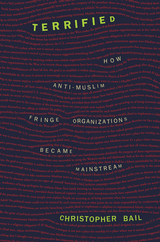Book Review: Terrified: How Anti-Muslim Fringe Organizations Became Mainstream

Christopher Bail: Terrified: How Anti-Muslim Fringe Organizations Became Mainstream. Princeton, NJ: Princeton University Press, 2015. 223 pp. $35.00, hardcover.
You can read the book review by Mary-Hunter McDonnell of Wharton School, University of Pennsylvania in the December 2015 issue of Administrative Science Quarterly. From the review:
This work presents a fascinating exploration of the rising influence of anti-Muslim fringe organizations in the United States after September 11, 2001. One might naturally assume that these organizations gained influence after 9/11 by exploiting a wave of grassroots anti-Muslim sentiment prompted by the 9/11 attackers’ self-identification as Muslims. But Bail’s account begins with surprising evidence that American attitudes about Muslims actually became more positive in the attack’s
immediate wake. His study suggests fringe groups influenced the popular understanding of Islam through a decade-long campaign in which these groups strategically reconstituted their cultural environment by successively solidifying their influence in the media, the field of civil society organizations, and the state. With this provocative case, Bail sheds light on the mechanisms of cultural evolution in the wake of major crises.
You can read the rest of the review from Administrative Science Quarterly for free by clicking here. Want to know about all the latest research and reviews like this from Administrative Science Quarterly? Click here to sign up for e-alerts!
































































































